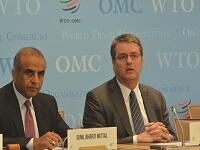News Brief (en)
A report by the Organisation for Economic Co-operation and Development (OECD) finds that declining productivity growth and rising inequality are some of the biggest obstacles to improved economic performance. The Productivity-Inclusiveness Nexus notes that a mix of cyclical and structural factors act as hindrances for companies wishing to implement technological advancements that would lead to higher productivity growth.
A cyclical factor highlighted in the report was the persistently low investment in physical capital, and on the structural side the increased dispersion between ‘frontier’ firms and companies lagging behind in their productivity performance. The OECD also noted that increased inequalities of income, wealth, well-being and opportunities in the majority of countries around the world further slowed the effort to improve individual well-being and undercut economic productivity potential.
Business leaders call for WTO to address pressing issues for business communityBusiness leaders on 30 May met with the World Trade Organization (WTO) at its Geneva headquarters to discuss how to better address current needs of the global business community. Among several things, they urged the WTO to look at how to improve e-commerce, establish rules to better facilitate services and investment flows, and enhance the support for micro, small and medium-sized enterprises.
The event was a part of Trade Dialogues, a new WTO initiative aimed at providing stakeholders from the business community with the opportunity to discuss their concerns on trade-related matters. The Trade Dialogues event brought together over 60 business leaders to discuss the challenges and opportunities they face in conducting trade operations and to discuss how the WTO can help in dealing with them. The attendees were from small and large enterprises, from developed and developing countries and from a variety of sectors. The event was held at the request of the International Chamber of Commerce (ICC) and the B20 group of leading independent business associations from G20 economies. It was facilitated by the WTO.
Kenya to host 14th UNCTAD ministerial conferenceThe 14th Ministerial Conference of the United Nations Conference on Trade and Development (UNCTAD XIV), themed ‘From Decisions to Actions,’ will be held in Nairobi, Kenya, on 17-22 July. Up to 7,000 participants are expected to attend the event, including heads of state and of government, ministers and other prominent players from the business world, academia, students and civil society.
The event will be the first key United Nations ministerial conference since the adoption of the Addis Ababa Action Agenda and the 2030 Agenda for Sustainable Development. During the five days several ministerial debates and high-level roundtable discussions will focus on how to achieve an inclusive and equitable global economic environment for trade and development. Four other events will be held on the sidelines of UNCTAD XIV: the World Investment Forum, the Global Commodities Forum, the Youth Forum and the Civil Society Forum.
Aid for Trade continues to attract funding but commitments are downWhile support for programmes targeted at
assisting poorer countries to expand their
participation in global trade continues to be
provided, funding for trade facilitation and
least developed countries (LDCs) fell in 2014,
according to the Organisation for Economic
Co-operation and Development (OECD).
The OECD said during an Aid for Trade
session of the Committee on Trade Development
on 25 May that contributions for trade
facilitation support fell from US$ 613 million
in 2013 to US$ 362m in 2014, a decline of more
than 40%. The OECD also said the terms of
support had become less accommodating
for LCDs, with 55% now being offered in the
form of loans rather than in grants. An explanation
for the drop in commitments could
be that several donors are in the process
of revising their Aid for Trade strategies.
The European Union will not have a new
strategy ready before the beginning of 2017.
On the other hand, actual disbursements of total aid commitments have had continued growth every year of between 5% and 10%. Aid commitments for private sector development, in particular for energy generation and productive capacity building, have risen the last couple of years and are likely to continue doing so due to the United Nations Sustainable Development Goals, which encourage partnerships with the private sector. The OECD said that LDCs still receive the highest amount of aid per capita.
United Nations calls for LDCs to be at the forefront of sustainable developmentA call for greater support and concrete actions for the world’s most vulnerable nations were among the outcomes of the Midterm Review of the Istanbul Programme of Action (IPoA) for the Least Developed Countries (LDCs) that took place in Turkey in late May. The three-day meeting, co-organized by the Government of Turkey and the United Nations Office of the High Representative for the Least Developed Countries, Landlocked Developing Countries and Small Island Developing States, reviewed the progress of 48 LDCs in sustainable development since the adoption of the IPoA in 2011.
Several of the suggestions for new implementations were based on actions items from the 2030 Agenda, the Addis Ababa Action Agenda, the Sendai Framework for Disaster Risk Reduction and the Paris Agreement on Climate Change. New initiatives such as the establishment of a governing council for the Technology Bank for LDCs to support their access to and increased use of science, technology and innovation were launched. Other initiatives and programmes focused on enhancing LDC access to duty-free and quota-free markets and offer favourable conditions that ensures that more exports items qualify for preferential treatment. Increased commitments to boost Aid for Trade and enhance the role of the UN in supporting LDCs to attract higher inflows of foreign direct investment were also emphasized.
Africa’s economic transformation hinges on unlocking potential of cities, report saysAfrica’s future growth and development depends on how it urbanizes, according to the African Economic Outlook 2016. The annual publication of the African Development Bank also argues that the continent’s economic performance remained resilient against global tumors and regional shocks in 2015.
The report warns that future economic growth and potential could be hindered by inadequate attention to the need of sufficient urban planning policies and investments. The combination of rapid urbanization and an unprecedented demographic boom is putting an extra pressure on the role of urban policy planning to unlock the cities’ economic potential and to secure the continent’s sustainable development. As of now, twothirds of the needed urban infrastructure investments up until 2050 is still lacking, the report says.









